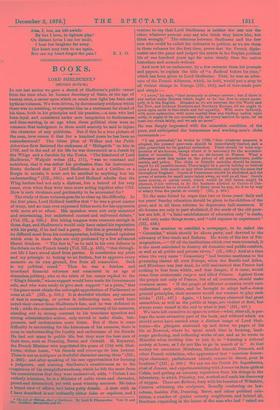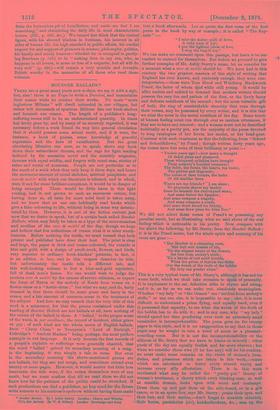BOOKS.
LORD SHELBURNE.*
[SECOND NOTICE.]
IN our last notice we gave a sketch of Shelburne's public career from the time when he became Secretary of State, at the age of twenty-nine, a career upon which so much new light has been cast bythese volumes. We were driven, by documentary evidence which there was no resisting, to represent him as a statesman far ahead of his time, both in his principles and his practice,—a man who had been loyal and consistent under sore temptation to factiousness and time-serving, in an age when those political vices were so common that indulgence in them could scarcely be said to injure the character of any politician. But if this be a true picture of the man, how comes it that for a hundred years he has been so misunderstood? The bitter jibes of Wilkes and the Public Advertiser first fastened the nickname of " Malagrida " on him in 1768, and to the end of his life he was denounced as a Jesuit by the Whigs and a Jacobin by the Tories. "The falsehood of Lord Shelburne," Walpole writes (II., 171), "was so constant and notorious, that it was rather his profession than his instrument. Burke declared that if Lord Shelburne is not a Catiline or a Borgia in morals, it must not be ascribed to anything but his
understanding" 235) ; and Lord Holland admits that the Whig leaders had not only a distrust, but a hatred of his very name, even when they were once more acting together after 1793. How is such virulence and pertinacity to be accounted for?
The study of these volumes goes far to clear up the difficulty. In the first place, Lord Holland testifies that " he was a great master of irony, and No man ever expressed bitter scorn for his opponents with more art or effect. His speeches were not only animated and entertaining, but embittered contest and enlivened debate." (VOL ILL, p. 326.) But biting tongues were common enough in those days, and Shelburne's would only have raised his reputation with his party, if he had had a party. But this is precisely where he differed most from his contemporaries, holding indeed opinions which even in these days are only professed by a few advanced liberal thinkers. " The fact is," as he said in his own defence in the debate on the French treaty (Vol. III., p. 433), " that through- out life I have stood aloof from parties. It constitutes my pride and my principle to belong to no faction, but to approve every measure on its own ground, free from all connection. Such is my political creed." Then he was a fearless and trenchant financial reformer and economist in an age of shameless jobbery, who at the crisis of his career replied to the " King's friends," whose support would have made his Government safe, and who were ready to-give such support "at a price," that 6the peace must obtain the unbought approbation of Parliament or none at all." p. 363.) It is doubtful whether any amount of tact in managing, or power in influencing men, could have saved their owner from Shelburne's fate, and he was deficient in both ; while the excessive and overstrained courtesy of his manners, standing out in strong contrast to his trenchant speeches and strong administrative action, only served to make rivals, lam- pooners, and caricaturists more bitter. But if there is some difficulty in accounting for the bitterness of his enemies, there is none in understanding the loyalty and enthusiasm of his friends. He had not many in public life, but they were the best men of their time, such as Dunning, Barre, and Oswald. M. Rayneval, the French Minister who negotiated the peace of 1782 with Shel- burne, writes home, " his friends and entourage do him honour. There is not an intriguer or doubtful character among them" p. 266) ; and after speaking of his rare opportunities for forming a judgment, and noticing Shelburne's sensitiveness as to the 'auspicious of his straightforwardness, which he felt the more from his consciousness that they were undeserved, adds, " Unless I am entirely mistaken, he is a Minister of noble views and character, proud and determined, yet with most winning manners. He takes a broad view of affairs, and hates petty details, A man such as I have described is not ordinarily either false or captious, and I • The Life of William, Earl of Shelburne, By Lord E. Fitzrasurice. Vols. II. and III. London : Macmillan and Co. venture to say that Lord Shelburne is neither the one nor the other, whatever persons may say who think they know him, but
think wrongly." The relations between Shelburne and the few men who could be called his intimates in politics, as we see them in these volumes for the first time, prove that the French diplo- matist saw the game and judged the actors in the English political life of one hundred years ago fir more clearly than the native historians and memoir-writers.
And now let us endeavour, by a few extracts from his journals and papers, to explain the title of "a Radical before his time," which. has been given to Lord Shelburne. First, he was an advo-
cate of the French Alliances, which, he held, would put a stop to all violent change in Europe 264), and of free-trade pure
and simple :—
"I avow," he says, "that monopoly is always unwise ; but if there is any nation under Heaven which ought to be the first to reject mono- poly, it is the English. Situated as we are between the Old World and the New, and between Southern and Northern Europe, all we ought to covet upon earth is free-trade and fair equality. With more industry, with more enterprise, with more capital than any trading nation upon earth, it ought to be our constant cry, let every market be open, let us meet our rivals fairly, and we ask no more."
He was deeply impressed with the miserable condition of the poor, and anticipated the temperance and working-men's clubs movements :—
"I am persuaded," he writes in 1788, " that whatever measure is adopted, the present poor-rate should be immediately limited, and a plan prescribed for its gradual extinction. There should be total sup- pression of ale-houses, except where it is necessary for the accommo- dation of travellers. There are no ale-houses in France. What a difference must this make in the prices of all manufactures, public morals, and police. The clubs or friendly societies should be °noon- raged by all possible means. There might be a parish holiday or festival once a year, with music or any other attraction, and upon the same day throughout England. Courts of Conscience should be abolished, and the power of arrests for small sums taken away, as well as all fees. Surely some county, or parish court, which would be still better, might be planned, if not revived, to do the business allotted to Courts of Con- science without fee or reward, or if there must be any, let it be by way of salary from the parish or county." (Ill, p. 435.)
To the same friend he urges that two or three years' daily and ten years' Sunday education should be given to the children of the poor, and in all these reforms he deprecates half-measures. If ale-houses are only in part abolished, if the seeds of the old poor- law are left, if "a faint establishment of education only" is made, it will only make things worse, and " add expense to experiment."
(HI, 438.) He was anxious to establish a newspaper, to be called the " Centralist," which should be above party, and devoted to the advocacy of free-trade and Reform. He wrote of the law of Pri- mogeniture,—" Of all the institutions which ever were invented, it is the most calculated to destroy all domestic and public comfort, as well as all public and private virtue." (IL, 360.) And at a time when the very name " Democracy " had become anathema to the governing classes all over Europe, when the Bastile had fallen, and Mirabeau was just dead, he still maintained that France had
nothing to fear from within, and that danger, if it came, would come from aristocratic émigrés and allied Princes. Against these the people not only of France, but of all countries, should make
common cause. " If the people of different countries could once understand each other, and be brought to adopt half-a-dozen general principles, their servants would not venture to play such tricks." (III., 487.) Again, "I have always observed that great assemblies, as well as the public at large, are violent at first, but always come round in the end to what is just." (III., 491.) We have left ourselves no space to notice—what, after all, is per- haps the most attractive part of the book, and without which we should never have carried away a distinct image of Lord Shel- burne—the glimpses scattered up and down its pages of his life at Bowood, where he spent much time in farming, land- scape gardening, and collecting works of art, and as he wrote to Morellet when inviting him to join it, in "forming a rational society at home, as I do not like to go in search of it." In that society we encounter Mirabeau, Morellet himself, Dumont, and other French celebrities, who appreciated that " interieur domes- tique charmant, parfaitement calcule, comma ils disent, pour le
bonheur." p. 389.) We can see the Dutch Dr. Ingenhouez, rival of Jenner, and experimentalising with Jenner on farm-girls at Calais, and getting an uncanny reputation from his doings in the laboratory, in which Priestley, too, worked and made his discovery of oxygen. There are Britton, busy with his beauties of Wiltshire, Canova criticising the sculpture, Hominy conferring on law- reform, besides Pitt, Dunning, Barre, and other political cele- brities, a number of quaint country neighbours, and behind all, Bentham expanding in the house of the man who had " raised me from the bottomless pit of humiliation, and made me feel I am something," and chronicling the daily life in most characteristic letters. (III., p. 460, &c.) We cannot but think that the central figure, with his shrewd wisdom in business, his interest in all sides of human life, his high standard in public affairs, his cordial respect for and support of pioneers in science, philosophy, politics, his kindly and manly humour—whether he is occupied in pacify. ing Bentham (p. 525) or in " making love to my son, who, as happens in all lovers, is more or less of a coquette, but all will do very well" (p. 492)—will remain a very notable and loveable British worthy in the memories of all those who read these volumes.



































 Previous page
Previous page